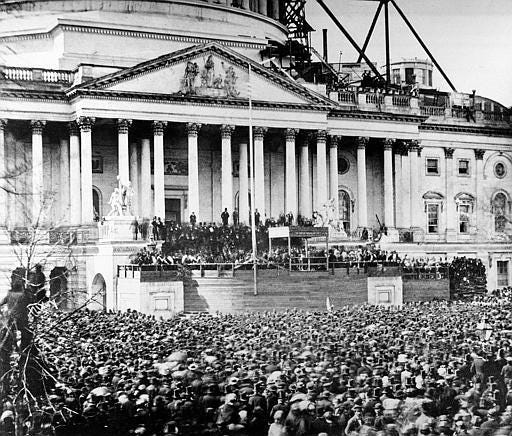The Foiled Confederate Coup of 1861
An interview with historian Ted Widmer about his book, “Lincoln on the Verge”
It’s time to refresh and recharge! am going on vacation for a week, so this is my last post until Monday, July 25, so all paying subscribers will get a one-week extension. And if you know someone who might like to join our merry crew, please:
As the January 6 Special Select Committee does its work, the longstanding American commitment to the peaceful transfer of power between administrations recurs repeatedly as Donald Trump’s original sin against democracy.
But in fact, Trump is not the only politician who has tried to overthrow an election. When Abraham Lincoln was elected president of the United States in November of 1860, it created an unprecedented political crisis. Southern slaveholding politicians were in charge of the government and, as they maneuvered to retain control of the laws and courts that upheld human bondage, they considered every option, from refusing to count the electoral votes to a coup d’état to assassinating the president-elect as he traveled to his inauguration. Militias were activated by Union forces in Washington and the assassination plot was foiled by Lincoln’s allies, but secession and civil war followed.
Ted Widmer’s book, Lincoln on the Verge: Thirteen Days to Washington (Simon and Schuster, 2020), now out in paperback, tells the gripping story of a short period in American history, and how democracy survived this political crisis.
Claire Potter: Ted, the United States was cracking apart in 1860, and Lincoln’s election lit the fuse of what would become the Civil War. But before the president-elect’s inauguration in the spring of 1861, slaveowners and their supporters sought to block Lincoln from taking office, by assassination if necessary. So, from the time he was elected to his inauguration four months later, there was a lot of maneuvering going on in Washington, D.C., that might have ended in a coup d’état by Southern politicians.
The first hurdle was that the president-elect had to get to Washington and, he hoped, solidify Union sentiment along the way. Why did Lincoln’s journey to the presidency appeal to you?
Ted Widmer: I began to follow the story of Lincoln’s train trip to the inauguration without knowing what a big topic it was going to be for me. I like trains, and I thought putting Lincoln on a train would be kind of fun. It had the added value of putting him in a different city every day. I could talk a little bit about what made Cincinnati, Ohio, or Pittsburgh, Pennsylvania, interesting. On this train ride, Lincoln saw different types of Americans and formed a more inclusive vision of what the country would be. And he showed a lot of personal courage since there was an active plot to assassinate him before the inauguration.
I also wanted to capture the excitement of a train ride through America in 1861. We now think of Springfield, Illinois, as the middle of the country, but in 1860, it was the West. Lincoln grew a lot during those weeks of travel, too. He had retired from politics after the Mexican–American War but jumped back in because he was so disgusted by the tendency of politics in the 1850s to protect corrupt special interests. And the most corrupt of all the special interests was the slave lobby.
As I wrote, I began to see slavery as similar to a modern lobby. It was a big industry, with plenty of people ready to take money to do whatever it took to protect it for another year or so.
Lincoln was personally disgusted by this. He started giving speeches denouncing corruption in Washington. But then he began to feel the need to run again: he ran for Senate in 1858 and lost to Stephen Douglas. But he was perfecting his moral argument, and in 1860, he was finally in the right spot. He’s “Honest Abe Lincoln” and it was a time when many Americans were just sick of the shenanigans in Washington, much like they are now.
CP: Let’s talk specifically about what activated voters in 1860: the Fugitive Slave Act. Passed as part of the Compromise of 1850, it required all enslaved people who had escaped to free states to be returned and it obligated all officials and citizens to assist and cooperate. Communities that protected free people of color and that helped them escape to Canada suddenly found themselves invaded by federal marshals working for the plantation aristocracy. In New York, a free woman was dragged to the Cooper Union and displayed in chains.
TW: Yes, and seeing how slavery worked was very powerful in energizing public opinion. In my research, I found that Independence Hall in Philadelphia had a jail cell for African Americans who were being returned to slavery, causing Americans to ask what the U.S. flag stood for. Lincoln was part of a generation that said the flag cannot stand for slavery. And a growing number of Americans agreed with him. That was his mandate.
CP: It’s a very powerful theme of the book, particularly as those who defend Confederate memorials try to pretend that the Civil War was actually about something other than slavery—it was not. Compromises like gradual emancipation were not working, even in states that had ended slavery.
Keep reading with a 7-day free trial
Subscribe to Political Junkie to keep reading this post and get 7 days of free access to the full post archives.




